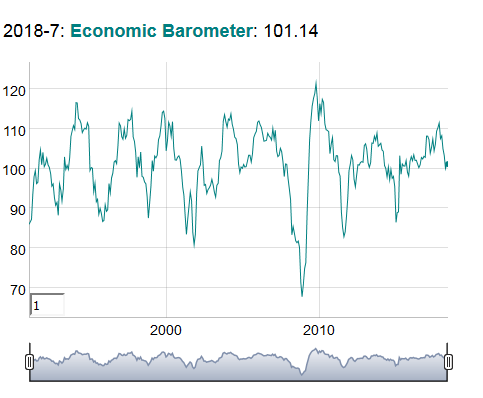The KOF Economic Barometer only slightly moved in July. Compared to its June value, it decreased by 0.2 to 101.1 points. The current Barometer value still stands slightly above the long-term average of 100 points; it thus indicates a slightly above-average economic development in Switzerland in the coming months. In July, the KOF Economic Barometer fell slightly to 101.1 points from 101.3 in June (101.7 in the initial publication in June). Negative indicators for manufacturing, the export industry and the accommodation and food service activities sector were mainly responsible for the slight decrease. Positive signals come from the banking and the construction sectors. In the goods producing sectors (manufacturing
Topics:
KOF Zurich considers the following as important: 2) Swiss and European Macro, Featured, newsletter, Switzerland KOF Economic Barometer
This could be interesting, too:
Nachrichten Ticker - www.finanzen.ch writes Die Performance der Kryptowährungen in KW 9: Das hat sich bei Bitcoin, Ether & Co. getan
Nachrichten Ticker - www.finanzen.ch writes Wer verbirgt sich hinter der Ethereum-Technologie?
Martin Hartmann writes Eine Analyse nach den Lehren von Milton Friedman
Marc Chandler writes March 2025 Monthly
The KOF Economic Barometer only slightly moved in July. Compared to its June value, it decreased by 0.2 to 101.1 points. The current Barometer value still stands slightly above the long-term average of 100 points; it thus indicates a slightly above-average economic development in Switzerland in the coming months.
| In July, the KOF Economic Barometer fell slightly to 101.1 points from 101.3 in June (101.7 in the initial publication in June). Negative indicators for manufacturing, the export industry and the accommodation and food service activities sector were mainly responsible for the slight decrease. Positive signals come from the banking and the construction sectors.
In the goods producing sectors (manufacturing and construction), the indicators of employment, business situation, production, barriers and capacities point to a positive development. They are counterbalanced by the negative outlook for orders, the competitive situation, intermediate goods, earnings and exports. Overall, the positive and negative indicators more or less balance each other out. The overall negative contribution of the manufacturing sector to the overall Barometer is due to the gloomier prospects in the chemical, paper and metal industries. The indicators for the food, wood and electrical industries have developed positively. |
KOF Economic Barometer, July 2018(see more posts on Switzerland KOF Economic Barometer, ) Source: kof.ethz.ch - Click to enlarge |
KOF Economic Barometer and reference time series: annual update
In September 2017, the scheduled annual update of the KOF Economic Barometer took place. The annual update of the Barometer concerns the following steps: redefinition of the pool of indicators that enter the selection procedure, update of the reference time series and renewed execution of the variable selection procedure. The updated reference series is the smoothed continuous growth rate of the Swiss Gross Domestic Product (GDP) according to the new System of National Accounts ESVG 2010, released in early September 2017, which takes into account the release of the previous year’s annual GDP data by the Swiss Federal Statistical Office. As a result of the indicator variable selection procedure, the updated KOF Economic Barometer is now based on 273 indicators (instead of 272 as in the previous vintage) from a pool of almost 500 potential indicator series. They are combined using statistically determined weights.
Tags: Featured,newsletter,Switzerland KOF Economic Barometer
